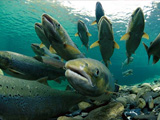Today.Az » Weird / Interesting » Genetically Modified Atlantic Salmon Mating Study Reveals Danger of Escape to Wild Gene Pool
16 July 2011 [01:31] - Today.Az
 If genetically modified Atlantic salmon were to escape from captivity they could succeed in breeding and passing their genes into the wild, Canadian researchers have found. Their research, published in Evolutionary Applications, explores the potential reproductive implications of GM salmon as they are considered for commercial farming.
If genetically modified Atlantic salmon were to escape from captivity they could succeed in breeding and passing their genes into the wild, Canadian researchers have found. Their research, published in Evolutionary Applications, explores the potential reproductive implications of GM salmon as they are considered for commercial farming.
"The use of growth-enhancing transgenic technologies has long been of
interest to the aquaculture industry and now genetically modified
Atlantic salmon is one of the first species to be considered for
commercial farming. Yet, little is known about the potential impact on
wild salmon populations if the GM species were to escape captivity,"
said lead author Darek Moreau from the Memorial University of
Newfoundland, Canada.
One of the key concerns about a transgene escape is the "Trojan gene
effect," caused when a GM fish outcompetes or reproduces equally against
wild rivals, however if the resulting offspring are genetically
inferior this could lead a species towards eventual extinction. Until
now there is no empirical research to demonstrate the ability of
transgenic Atlantic salmon to breed naturally and infiltrate the wild
gene pool.
In the wild, reproducing males present two main forms of rivals which
any escaping transgenic male would have to compete with; large males
which have migrated and returned from the sea and smaller male parr
which have matured in freshwater. The large males are aggressive and
develop attributes to fight off their rivals, while the smaller male
parr use cryptic colouring and 'sneak fertilisation' to compete.
To measure the ability of transgenic males to complete with wild
males during the reproductive season the team monitored breeding
behaviour in a naturalised laboratory setting and used genetic analysis
to determine the success of competing individuals at producing
offspring.
Large, migratory wild males outperformed their captivity-reared
transgenic counterparts in terms of a variety of spawning behaviours.
Moreover, despite being less aggressive, non-transgenic male parr were
also able to outperform their GM rivals in terms of spawning behaviour,
and as a result, achieved higher overall fertilisation success.
"While the transgenic males displayed reduced breeding performance
relative to their non-transgenic rivals they still demonstrated the
ability to successfully participate in natural spawning events and thus
have the potential to contribute modified genes to wild populations,"
said Moreau. While the study provides an estimate of breeding
performance under only a single set of physical and demographic
environmental conditions, it does mimic a likely invasion scenario where
the genetic background of the transgenic population differs from that
of the wild population.
"Our study provides the first empirical observations on the natural
reproductive capacities of growth hormone transgenic Atlantic salmon,"
concluded Moreau. "While the resulting ecological and genetic effects of
a transgene escape remain uncertain, these data highlight the
importance of preventing reproductively-viable GM salmon from entering
natural systems."
/Science Daily/
|